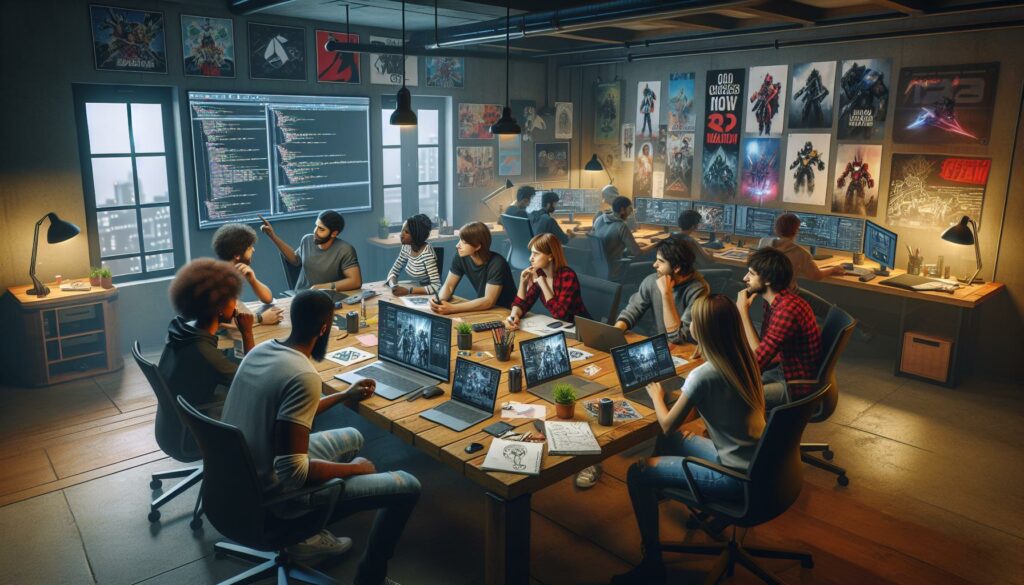As a game developer who’s spent over a decade in the industry I’ve witnessed firsthand how video game development has transformed into one of the most exciting career paths in tech. The gaming industry now offers diverse opportunities that go far beyond just programming creating an incredible range of roles for creative and technical minds alike. I’ve found that many aspiring developers don’t realize just how many different positions exist in game development. From 3D artists and sound designers to narrative writers and QA specialists the industry needs professionals with varying skillsets to bring virtual worlds to life. Whether you’re a coding enthusiast creative storyteller or project management pro there’s likely a perfect role waiting for you in game development.
- The video game industry generates $184.4 billion annually and offers diverse career paths beyond programming, including art, design, sound, and project management roles.
- Career opportunities exist across different types of studios – from AAA developers and indie teams to mobile game studios and VR specialists, each offering unique workplace cultures.
- Core development roles include programmers ($45K-180K salary range), game designers, artists, and technical support positions like QA testers and DevOps engineers.
- Essential skills require mastery of industry tools like Unity/Unreal Engine, programming languages (C++, C#), and 3D modeling software, along with a strong portfolio showcasing completed projects.
- Career advancement follows three main paths: technical (leading to Technical Director), creative (leading to Art/Design Director), and management (leading to Executive Producer), with salaries ranging from $45K for entry-level to $250K+ for director positions.
Jobs in Video Game Development
The video game industry generates $184.4 billion in annual revenue and employs over 200,000 professionals worldwide. I’ve witnessed significant transformations in development practices technologies throughout my career in game development.
Key Industry Trends and Growth
The gaming industry experiences consistent year-over-year growth of 8.4% driven by mobile gaming expansion digital distribution platforms. Key trends include:
- Cloud gaming platforms like Google Stadia Amazon Luna transform game delivery methods
- Cross-platform development enables games to reach wider audiences across PC mobile console
- Extended Reality (XR) creates opportunities in VR AR game development
- Live service games generate continuous revenue through regular content updates microtransactions
- AI implementation enhances NPCs procedural content generation gameplay mechanics
| Platform | Market Share | Annual Growth |
|---|---|---|
| Mobile | 45% | 11.2% |
| Console | 32% | 6.8% |
| PC | 23% | 4.9% |
Types of Game Development Studios
The industry comprises distinct studio categories each with unique development approaches:
- AAA Studios: Teams of 100+ developers creating high-budget titles like Call of Duty Grand Theft Auto
- Independent Studios: Small teams of 5-20 developers focusing on innovative gameplay mechanics creative concepts
- Mobile Game Studios: Specialized teams developing free-to-play games casual gaming experiences
- Virtual Reality Studios: Teams focused on immersive experiences using VR AR technology
- Game Engine Companies: Organizations developing tools frameworks like Unity Unreal Engine
- Support Studios: Teams providing outsourced services in art animation quality assurance
Each studio type offers different career opportunities workplace cultures development methodologies suitable for various professional goals expertise levels.
Core Development Roles
Core development roles form the foundation of game creation, with specialized professionals working together to transform concepts into playable experiences. Here’s a detailed look at the primary positions that drive game development forward.
Game Programmers and Engineers
Game programmers write the code that powers video games, focusing on specific technical aspects of development. Core programming roles include:
- Engine programmers who develop the fundamental systems for graphics, physics and audio
- Gameplay programmers who code game mechanics, character behaviors and player interactions
- Network programmers who create multiplayer functionality and online features
- Tools programmers who build custom software to support the development process
- AI programmers who develop non-player character behaviors and game intelligence systems
Game Designers
Game designers shape the player experience through creative and technical decision-making. Key design specialties include:
- Systems designers who create game mechanics, economies and progression structures
- Level designers who craft game environments, missions and challenges
- Combat designers who develop fighting mechanics and enemy encounters
- UI/UX designers who create intuitive menus and player interfaces
- Narrative designers who integrate storytelling elements into gameplay
- Concept artists who establish the visual style and create preliminary artwork
- 3D modelers who create characters, environments and props
- Texture artists who design and apply surface details to 3D models
- Technical artists who bridge the gap between art and programming
- Character animators who create fluid movements and expressions
- VFX artists who develop particle effects and visual impact elements
Technical Support Roles
Technical support roles form the backbone of game development operations, ensuring smooth production workflows and maintaining high-quality standards. Here’s an analysis of key technical support positions based on my 12 years of industry experience.
Quality Assurance Testers
QA testers serve as the first line of defense against software defects by conducting systematic testing procedures. They document bugs using specialized tracking software like Jira or Bugzilla, verify fixes, validate gameplay mechanics for balance issues, assess performance metrics across different hardware configurations. QA specialists earn an average salary of $52,000, with senior positions reaching $85,000.
Key responsibilities:
- Execute test plans across multiple platforms & devices
- Report technical issues with detailed reproduction steps
- Perform compatibility testing on various hardware configurations
- Validate localization content in multiple languages
- Conduct performance benchmarking & stress testing
Tools Developers
Tools developers create custom software solutions that streamline game development processes. They build level editors, asset management systems, automation scripts, debugging utilities. The average salary for tools developers ranges from $85,000 to $130,000 depending on experience level.
Essential functions:
- Design intuitive interfaces for content creation tools
- Develop asset pipeline automation systems
- Create debugging & profiling utilities
- Maintain build systems & deployment tools
- Implement version control integration
DevOps Engineers
DevOps engineers manage the infrastructure that supports game development & deployment. They oversee continuous integration/deployment (CI/CD) pipelines, maintain build servers, optimize development workflows. DevOps engineers command salaries between $95,000 to $150,000 annually.
- Configure & maintain build automation systems
- Implement deployment pipelines for multiple platforms
- Monitor server infrastructure & performance
- Manage source control systems & branching strategies
- Set up containerization & virtualization solutions
| Role | Entry-Level Salary | Senior-Level Salary | Years of Experience Required |
|---|---|---|---|
| QA Tester | $42,000 | $85,000 | 0-2 |
| Tools Developer | $85,000 | $130,000 | 3-5 |
| DevOps Engineer | $95,000 | $150,000 | 4-6 |
Creative and Production Roles
Creative specialists shape the emotional elements of video games through sound, storytelling, and management systems. Here’s a detailed look at these essential roles.
Sound Designers and Composers
Sound designers create immersive audio environments through sound effects, ambient noise, and interactive audio systems. They work with digital audio workstations (DAWs) like Pro Tools, FMOD, and Wwise to implement 3D positional audio and dynamic music systems. Composers develop original soundtracks, character themes, and adaptive music that responds to player actions. Entry-level sound designers earn $55,000 while senior composers command up to $120,000 annually.
Writers and Narrative Designers
Writers craft compelling stories, character dialogue, and world-building elements that drive player engagement. Narrative designers integrate storytelling mechanics into gameplay through branching dialogues, quest structures, and environmental storytelling. They use tools like Twine and Articy:draft to prototype narrative systems and collaborate with level designers to ensure story integration. The salary range spans from $60,000 for junior writers to $115,000 for lead narrative designers.
Producers and Project Managers
Producers coordinate development teams, manage resources, and ensure projects meet quality standards within budget constraints. They track milestones using project management tools like Jira and Hansoft, facilitate communication between departments, and resolve production bottlenecks. Project managers oversee specific game features or content drops, maintaining delivery schedules and team workflows. Producer salaries range from $70,000 to $140,000 based on experience and studio size.
| Role | Entry-Level Salary | Senior-Level Salary |
|---|---|---|
| Sound Designer | $55,000 | $95,000 |
| Composer | $65,000 | $120,000 |
| Writer | $60,000 | $100,000 |
| Narrative Designer | $65,000 | $115,000 |
| Producer | $70,000 | $140,000 |
Breaking Into Game Development
Game development careers require a combination of technical skills, creativity, and practical experience. Entry-level positions demand specific qualifications and a proven track record of completed projects.
Essential Skills and Education
Game development proficiency stems from mastering programming languages, design tools, and industry-standard software. A bachelor’s degree in Computer Science, Game Design, or Digital Arts provides foundational knowledge, while specialized certifications in Unity or Unreal Engine demonstrate technical expertise. Essential technical skills include:
- Programming proficiency in C++, C#, or Java for game development roles
- 3D modeling expertise in Maya, Blender, or 3ds Max for artistic positions
- Version control systems like Git for collaborative development
- Game engine familiarity with Unity or Unreal Engine for practical development
Building Your Portfolio
A portfolio showcases practical skills and completed projects to potential employers. Strong portfolios include:
- Completed game projects demonstrating core mechanics
- Source code repositories with documented contributions
- Technical demonstrations of specific skills
- Game design documents for conceptual work
- Collaborative project examples showing teamwork
- Game modifications or mods for existing titles
- Mobile apps or indie games published on platforms
Key portfolio statistics to highlight:
| Portfolio Element | Impact Measurement |
|---|---|
| Published Games | 2-3 completed projects |
| Code Samples | 5-10 documented examples |
| Design Documents | 3-5 detailed proposals |
| Team Projects | 2-3 collaborative works |
I recommend updating portfolios quarterly with new projects, maintaining active GitHub repositories, and participating in game jams to generate fresh content. Online platforms like Itch.io or Steam provide opportunities to showcase completed work to a broader audience.
Career Growth and Advancement
Game development careers offer substantial growth potential through multiple advancement paths. I’ve observed professionals progress from entry-level positions to senior roles with increased responsibilities and compensation.
Salary Expectations
Compensation in game development varies based on role specialization, experience level and geographic location. Here’s a breakdown of typical annual salary ranges in the US:
| Role Level | Years Experience | Salary Range |
|---|---|---|
| Junior | 0-3 | $45,000-$75,000 |
| Mid-Level | 3-7 | $75,000-$120,000 |
| Senior | 7+ | $120,000-$180,000 |
| Lead/Director | 10+ | $150,000-$250,000 |
Top-tier studios in major tech hubs like San Francisco or Seattle offer additional compensation through stock options, profit sharing and performance bonuses ranging from 10% to 30% of base salary.
Professional Development Paths
Career advancement in game development follows three primary trajectories:
- Technical Path
- Junior Developer → Senior Developer → Technical Lead → Technical Director
- Focus on deepening programming expertise and architectural skills
- Responsibility for code quality and technical innovation
- Creative Path
- Junior Artist/Designer → Senior Artist/Designer → Art Director/Design Director
- Emphasis on portfolio expansion and creative leadership
- Oversight of visual style or game mechanics
- Management Path
- Associate Producer → Producer → Senior Producer → Executive Producer
- Development of project management and team leadership abilities
- Accountability for schedules, budgets and team performance
Each path includes opportunities for specialization in areas like:
- Engine development
- Artificial intelligence
- User experience design
- Live operations
- Cross-platform development
Professional certifications from Unity, Unreal Engine or Autodesk enhance advancement prospects when combined with shipped game titles and team leadership experience.
Having spent years in game development I can confidently say it’s one of the most exciting and rewarding career paths in tech today. The industry continues to evolve rapidly offering incredible opportunities for both creative and technical minds.
Whether you’re passionate about coding crafting stories designing gameplay or creating art there’s likely a perfect role waiting for you. The key is to identify your strengths build relevant skills and showcase your work through a strong portfolio.
I’ve seen firsthand how the gaming industry welcomes talented individuals from diverse backgrounds. With its strong growth trajectory competitive salaries and clear advancement paths now’s the perfect time to start your journey in game development.


